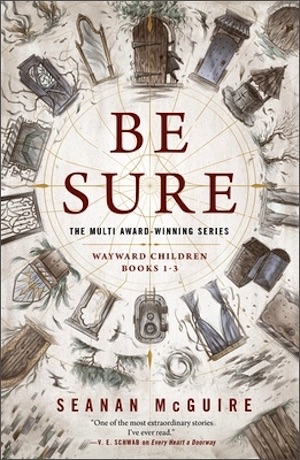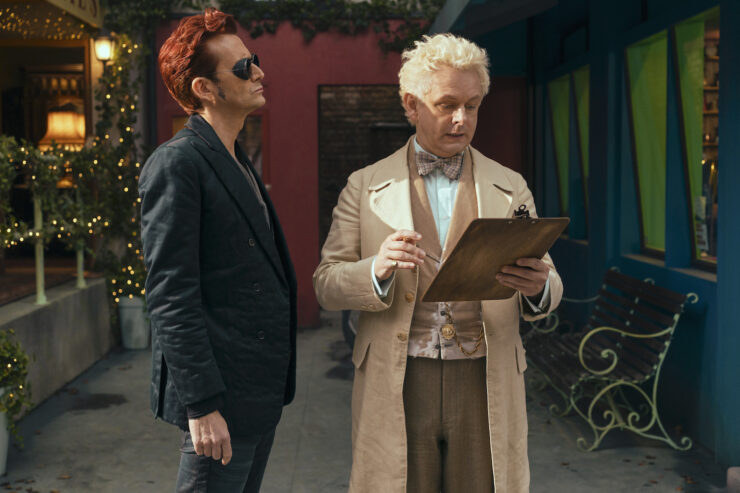When the first (and at the time, many of us presumed, the only) season of Good Omens arrived in 2019, I was shocked to find that the show was something altogether different than I had expected. When it was announced that the show would have another season, I was equally shocked: Not because I didn’t want it to receive one, but because I didn’t believe it was possible.
Here’s the thing—I’ve actually been waiting for a continuation of this story most of my life. Having it come to pass seemed unlikely at this point. But it’s been four years since season one, and here we are. And after watching the most recent six episodes, I’m beginning to worry that Amazon has read my diary? (That’s a lie, I don’t have a diary. Just the weird running dialogue in my head, which you are now privy to.)
Season two is meant to serve as a bridge between the story of the novel, and the planned sequel that Terry Pratchett and Neil Gaiman sketched out together some time ago. (If you’d heard what little had been shared about the sequel plan, there were a couple hints in the current season that you likely picked up on a little easier than folks not in-the-know.) Said bridge is largely concerned with the fallout after the distinct lack of Armageddon in the first season. Crowley (David Tennant) and Aziraphale (Michael Sheen) have been personas non grata to their respective head offices ever since, and doing their best to keep their heads down and avoid more scrutiny.
This is made impossible when the Archangel Gabriel (Jon Hamm) turns up with no memory on Aziraphale’s doorstep, insisting that something terrible might happen to him—and only the ostracized Principality can protect him from said terrible vagary.
Much of what goes down stems from this minor hiccup in celestial operations, and it gives season two a very different structure from the first—indeed, all of the other characters feel much more like featured players than central figures. Good Omens the novel was a book with an ensemble cast, and the adaptation of the book largely stuck to that rendering. Now that the story is continuing past that point, it belongs very much to the angel and demon who tried to avert the world’s end.
Because here’s the other thing: The first season, against all odds and probabilities, wound up telling a love story between Crowley and Aziraphale. But due to the way the plot is structured, it’s actually more accurate to say that the first season told this love story from Crowley’s perspective. Most of the events that take place make it abundantly clear how he feels about the angel, only for us to watch Aziraphale continually place caveats and placeholders on their millennia-long relationship. It’s Crowley who wants to run away with the angel during the Apocalypse. It’s Crowley who insists upon “their side” even when Aziraphale refuses to give credence to it. It’s Crowley who sobs drunkenly in a bar after losing his best friend, and gamely drives through a wall of fire to meet that friend at the site of Doomsday.
The second season is, in many ways, that very same love story—told from Aziraphale’s perspective. We’re given more pieces of the story throughout history, moments in time when the angel had his share of revelatory experiences in Crowley’s presence. (We even find out the aftermath of that bombing during the London Blitz.) Strangely, in watching it from a new vantage point, a different possibility emerges: Perhaps Aziraphale has always known that there’s something profound between them. Unfortunately, his toxic relationship with Heaven keeps taking precedence, but the last five years seem to have made that less of an issue.
That difference bleeds through in every interaction Crowley and Aziraphale have in the present. There is a sense that the pair have been working on things during the intervening years (and there was a pandemic, which makes you think that Pestilence was very put out at not being invited to Armageddon)—which, of course, would be the sensible avenue after their comedy of errors almost brought about the very Apocalypse they tried to avert. This palpable shift betwixt them makes for television that can only be described in the most earnest of terms.
They are despicably endearing, is what I’m trying to say.
In many ways, this makes the plot-y bits of the season a near-afterthought, though it is fun. There’s the mystery surrounding Gabriel, there’s difficulty with Crowley’s demonic replacement Shax (a delightfully recast Miranda Richardson), there’s the burgeoning and complicated relationship between Nina (a delightfully recast Nina Sosanya) and Maggie (a delightfully recast Maggie Service). All of it is enjoyable certainly, but none of it ever feels particularly urgent, even when danger rears its head. In so many ways, the driving action of the story is superfluous when compared to the delightful repartee happening in nearly every scene, between every single character. And there are some surprising bits of handshaking with the fandom as well—one character relationship in particular that was seemingly willed into existence by Tumblr itself.
Buy the Book


Be Sure
There’s another aspect of the second season of Good Omens that needs recognition because everyone involved has seemingly worked so hard to incorporate it: Specifically, the inclusion and acceptance of many forms of difference that are currently under threat from all corners of the globe. There is queerness here, of every stripe, and no one bats an eyelash. There is disability, and no one makes a comment. There is diversity in a multitude of forms, arranged at infinite intersections, and it never warrants shock or ignorant jibes. Aziraphale’s cotillion ball (patterned after Jane Austen’s fiction, of course) is meant to be a shopkeepers’ association meeting, but, in effect, it is showcasing the singular community that the angel has created for himself by virtue of being the guardian angel of London’s Soho for a couple of centuries at this rate. With all of this in play, the entire season seems deliberately arranged to say: You have a place here, because of course you should.
For a show that has attracted a fanbase composed largely of the sorts of people who could use that message, it is unaccountably heartening to see. A television show cannot fix the world’s evils, but offering us some respite is a worthwhile act in itself. All of this amounts to a season that is the cerebral equivalent of being wrapped in a soft blanket with all your favorites foods and warm drinks when the weather is unaccountably chilly…
…until the final episode.
Now if they would only hurry up and green light a third season, because it absolutely cannot end where it does.
Emmet Asher-Perrin will talk later about how this is a thing they have been waiting for maybe forever, don’t look at them, they’re fine. You can bug them on Twitter and Bluesky, and read more of their work here and elsewhere.











I enjoyed what I didn’t know was a first season, even though I’m not particularly fond of the book, mostly because it was well done and the cast was beyond amazing.
I did not particularly like the queering of what I always saw first and foremost as a friendship. I’m as queer as you can get, but friendship for me is maybe the highest, purest form of love. The romantic angel… er, angle… on Aziraphale/Crowley felt forced to me.
Then I started watching the second season over the weekend for a lark, with zero expectations.. and I was hooked. What a delicious, deliciously frothy, deliciously queer soufflé! Gaiman and the rest of the creators truly outdid themselves here.
And the cast. Good heavens, that cast. Heavenly, that cast.
I laughed till I cried, and I cried till I… cried.
Now I can’t wait for Season 3! Hopefully we won’t have to wait four more years for it.
“In many ways, this makes the plot-y bits of the season a near-afterthought, though it is fun.”
This line. Everything I dislike about this season summed up here.
Not to say I didn’t enjoy the “fun” but I wished the plot parts were better developed.
The love story though… just fabulous. I will be crushed if we don’t get a continuation of this story.